Mind the Gap: June 2008 Archives
Can we declare today Create Something Day? Or how about this week?

I bring it up because I'm feeling inspired, and David Morneau is my flashing beacon. Every day for the past year David has produced a new 60-second composition, and his personal creative marathon is over today! Congrats, David!
Like the most irritating news reporter, I rode along side him during the home stretch and shouted out some questions from the air-conditioned pace car. Morneau must not have been even slightly winded, because he gave me some of the most thoughtful and inspired answers I've heard in a long while. Now I really want to make some art myself. And I think some serious deadline pressure is what it's going to take to make it happen.
[cue theme music]
Get the Morneau creativity pep talk here and listen to the music here.
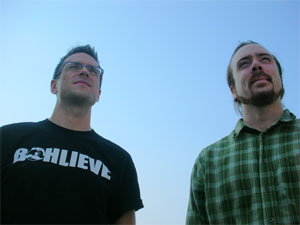
Asymmetrical haircuts and ironic clothing just not your thing? If the prostelizations coming out of the Church of How Indie Rock Will Save Concert MusicTM leave you cold, perhaps it's time to look elsewhere.
With faces as straight as Stephen Colbert, the gentlemen of HGP take a few cues from their hometown club scene, slide everything off the table, and throw down. Destined to be the #1 Hot Summer (New Music) Jam of 2008, come on, boyz, shake it up (but watch your language).
Since moving to Charm City, I've spent quite a few hours alone in a room with only my computer for company--and it was starting to drive me insane. I hadn't realized how crazy until today when a friend came over to do her own work in the quiet of the next room. Companionate typing and coffee break conversation is all it took to realign my perspective on the world and improve my mood entirely.
Ever since NPAC, I've been unable to shake a comment that was made at my table during one of the group caucus session discussions: The best artists are inherently selfish people by design, only interested in their own goals, and so this whole desire to strategize some kind of collective action plan will never work.
Okay, yes, 15-year-old Molly found herself in love for the first time when Howard Roark laughed, but wasn't this pronouncement of dedicated self-focus a bit harsh? Then Corey, my sparing partner in cultural thought, jumped in to refocus my view.
One of the things we value in an artist is his or her ability to show us how to look at things in different, unexpected ways. I think that quality is the opposite of selfish, but any time you attempt to widen someone's perspective, you run the risk that they will feel threatened by that and react against it and call you selfish. I wonder if finessing the way you challenge accepted norms so that it doesn't threaten people is one of the most important qualities an artist can possess.
In the quiet of our boxes, we fight fiercely to create and communicate, and it can make us unbelievably proud and scare the shit out of us all at the same time, and that's all even before we show it to our best friend. But we are not isolated figures in that moment. We have begged, borrowed, and stolen our stories and our influences out of our enemies' cars and our lovers' mouths, and I think we are speaking as loud as we can, even if the sound is delayed for a little while. And claim what we will, if no one listens when it's finally truly expressed, I think we feel we have failed, even if a person 50 years down the road hears us as clear as day. So let's not make excuses and remove ourselves from the challenge of real life connective work. It's difficult and heavy; and yes, many of us are cynical, which will make it even harder. But I don't think even the most Dietrich of us seriously wants to be alone.
Just got word that a friend has gone off to fight wars again. He actually speaks the right languages and has an inspiring moral code, so I'm not passing judgment but holding on to a kind of prayer. He introduced me to some of my favorite daily reading; if you're not following Pearls already, might I recommend a link? Pig is my favorite.
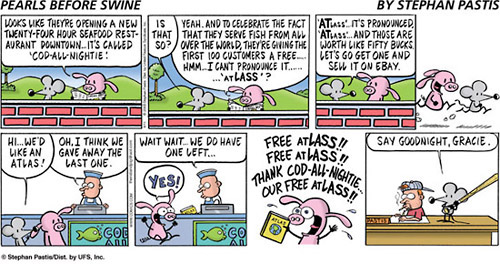
This interview is part of a series in which very talented people indulge my curiosity about their work. If there's someone you know that I should meet, please let me know.
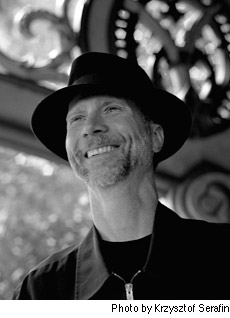
Alaska seems a strange home for a composer, John. If you were looking for unusual landscapes, couldn't you have gotten a suitably cheap and isolated studio a little closer to the action (not to mention a few more musicians) in, say, Detroit? Is that much snow and darkness good for your work (not to mention your equilibrium)?
I've always seemed to gravitate toward extremes. And I came to Alaska to get as far away from the action as I could! In art and in nature, the edges are the places where the most exciting things happen.
I am, of course, just jealous. I've seen photographs of the area you call home, and it is quite awe inducing. Is there a lot of fishing, wood chopping, and hiking in your life, in addition to the notating and the orchestrating, or have I just read too much Jack London?
My own reading tends toward John Haines and David Abram. But I do feel fortunate to live in one of the most powerful places on Earth. And I'm happy to say there's still a fair amount of wood splitting, sauna sweating, hiking, and camping in my life.
Next week we'll be performing and filming my percussion cycle Strange and Sacred Noise out on the tundra. And I've begun sketching a big new piece to be premiered next summer in the Canadian Rockies, as part of Steve Schick's new percussion institute at the Banff Centre. So my work is keeping me in touch with earth, air, fire, and snow.
Environmental work is actually what first brought you to Alaska in the 1970s, and you now frequently speak out about the dramatic climate changes you've witnessed in your home state over the last decade. Since many of your pieces draw directly on your experience of your environmental surroundings, how does this crisis impact your work?
We're living at a moment of unprecedented change, faster and more dramatic than any other in the history of our species. Nowhere is this more apparent than in the Arctic. As the signs of climate change become undeniable, my work is expanding to a more global perspective. One of my current projects is a new sound and light environment for Venice, Italy...another beautiful place that's seriously threatened by climate change.
Despite the vicarious romance we may attach to the Arctic adventure you're living, you do leave your little cabin in the woods and travel world-wide for performances and such. Do you find that the music you write changes depending on what city you're in? Do you restrict yourself to writing only in certain places? Are you inspired when you're away by other landscapes, by walking down urban streets?
I love the noise and the energy of New York, Amsterdam, and other great cities. And in recent years I've become enamored with the special magic of the desert. Wherever I may be, I'm sketching and thinking about new work all the time. But when I'm traveling I'm usually too busy to compose. So most of that still happens in my one-room cabin studio.
In our previous conversations, you've referred to yourself as a recovering drummer. How much of a foot do you feel you have in the "classical" world and how much are you attached to the worlds and opportunities offered by other genre areas? Has that changed over the years?
I didn't really grow up in classical music. So, to tell the truth, I've always felt a bit of an outsider in that world. I came of age playing in garage bands. But when I discovered Varése, Cage, Feldman, Harrison, Nancarrow, Tenney, and company, there was no turning back.
At this point in my life all those influences have long since been assimilated, and now I live pretty much in my own musical world. But right now I'm working on a piece that uses the most basic materials of rock and classical music-major and minor triads.
This is the first time I've used conventional harmonies in my music. But not to worry...The treatment is anything but conventional. I tend to think of harmony as color. So this is just another set of colors for the palette. And I'm spreading them freely, all over the canvas.
It doesn't matter much to me what we call music or how we talk about it. All that really matters is what it sounds like, and how it moves me. As a listener, my favorite thing is to hear something I haven't heard before. And as a composer, the thing that makes me happiest is when someone half my age likes what I'm doing.
It was fun to read in that recent New Yorker profile that you and your wife, Cynthia Adams, serve on the board of the Alaska Goldpanners, the local amateur baseball team. I was shocked! Further research turned up this photo. Be honest, John, were you finishing a piece between hot dog bites?
There's not much time for hot dogs. When I go to the ballpark, I always keep a scorecard. Keeping score keeps me in the game. It's a kind of meditation aid that helps me stay focused in the present moment and the unfolding intricacies of the game. So at the ballpark, as in my day job, scorekeeping seems to be what I do.
And I'm not alone. There's a long line of composers-from Ives to Babbitt to Polansky, Mahler (David, not Gustav!) and Altieri-with a passion for baseball.
I'm not much interested in sports. Of course, baseball isn't a sport. It's a game. At times it approaches the condition of art. But, as Peter Schjeldahl observes: ..."in art none of the players knows for sure what the game is."

While I've been overcoming the sleep deprivation and the jet lag, I've been reviewing what went down at this year's massive National Performing Arts Convention and contemplating why it's left me both incredibly inspired and intensely frustrated by the state of the arts.
Unlike the sort of test-run NPAC in Pittsburgh in 2004 where meeting-and-greeting outside my field was possible due to proximity in hallways between sessions but a high hurdle to clear, this time around the individual disciplines had a reason to talk to one another--they were trapped at tables together every day for an hour or more and were obliged to discuss the great issues of the day. This was a great improvement. That said, the AmericaSpeaks process was a lesson in everything that seems wrong to me with democracy--many people making decisions on topics most don't have the time to fully grasp before voting requires them to take ill-formed stances. The results: average, predictable. The challenges we enumerated as a voting group of some 3000 performing arts community members:
- Our communities do not sufficiently perceive the value, benefits, and relevance of the arts, which makes advocacy and building public support for the arts a challenge at every level.
- The potential of arts education and lifelong learning in the arts is under realized.
- The increasing diversity of our communities creates an opportunity to engage a variety of ages, races, identities, and cultures in our audiences and organizations.
That said, overcoming some of these challenges and making improvements will certainly help our social and economic standing, if not our art. In many cases it may add spice there, too. But the process that carried us to embracing these goals wasn't designed to push at the field's status quo. In our conversations together (often limited to 20 minutes at most per topic area) there was no time to think beyond the usual suspects, beyond the usual frame of reference. Voting felt like boiling things down, not building possibilities up. Maybe my expectations were too great, my desire to have it all now too outsized. Perhaps that's where we are now set up to go next time, without tripping in the ditch of misunderstanding where our colleagues in other areas are coming from. I often find I'm set to "full steam ahead" at the risk of immediate scalding. But still: profile, education, diversity. You don't say?
Speaking of not understanding where people are coming from, I admit that I was one of the groaners when it came to plenary speaker Jim Collins. "Doesn't he write those books business people buy in airports," I'd announce to everyone I discussed his session with. But he gave his "Why Business Thinking is NOT the Answer" talk with revival-tent bravado and it was filled with some take-away gems. Survival is not about circumstance, but about choice and discipline. "Who" comes before "what" when choosing the team, and then the impetus needs to be on creating conditions and leadership where people can unify around not the "consensus" idea, but the "right" idea. (Yeah, well, no one said it was crystal clear and easy. He still wants you to buy his books at airports.)
Collins also stressed that we need to look to the successes in our field like beacons, that greatness is cumulative action not a single event, and that decline can be in process long before we see the shadow it's casting. But fire a bullet, not a canon ball, and calibrate your strategies before empting your clip.
In the end, he urged those in the room to hold true to our core values but not to fear changing our practices. The key, he suggested, is to hold tight to who we are, but not to confuse that with keeping a death grip on what we do and how we do it.
Now that we've come back down the mountain, sounds like it's time to go to work. The next challenge is a personal one for anyone who wants to lend a hand: What can I do to further these goals?
Throughout the event, however, the occasional sign kept popping up. "Where is Madhusree Dutta?" they read. Abreu and Acogny had both been introduced to the audience by a short biographical film about their work, and it was announced from the stage after the session had ended (and a chorus of children had sung us "America the Beautiful") that Dutta's film had contained some material (related to Bush and the current wars) that she was asked to remove. It seems she instead declined to attend. Regardless of what the material was, during a conference at which the focus is on coming together across disciplines and listening with sensitivity to our colleagues about their own struggles and challenges, it was alarming to some of those gathered that Dutta was treated in this way. There's probably a lot more to this story than the censorship angle presented to me, so I don't mean to pass any kind of judgement here, but if that's exactly what happened, in a way Madhusree Dutta made her point quite poetically by where she was not.
This week I report to you live from the National Performing Arts Convention in Denver. In many ways, conferences such as this one are a time for reflection on the big picture, away from the nitty gritty details of everyday office life. That said, I don't think I have shut up since 7 a.m., so I am seriously doubting how well I am reflecting. It seems like every time you turn around here there's some amazing new person to talk to, and it's hard to stop.
I did lock it down long enough to take in some great thoughts (yes, other people's thoughts) today, however. Anna Deavere Smith took the mic during the opening session to speak about why the institutionalization of art can be a dangerous beast, why "public" is not a dirty word, and why we might do well to reconsider our architecture. She got my mind churning.
1. Beware the well-organized closet: Are we really looking for art to come from the reasonable man? Smith suggested that she'd rather engage with the foolish person, and I see her point. Sure, it's a crazy, messy business, but when artists are all toeing the line, isn't that really and definitively The End? In an age when the Fourth Estate is slacking in its duties, can we afford the comfortable, centralized, sanctioned artist?
2. Somewhere along the way, public art got perceptually aligned in the public conscience with the public toilet. Smith didn't go much further here, but it's not hard to see what the implications are. Art designed for use by and engagement with the public is not the 8th sin but the 9th wonder. No need to hold your nose.
3. We need tents not stone buildings. Art is not General Electric, and we need to value mobility into the community over perceptions of grandeur. The image of the gilded hall loomed large in my mind at this point in the talk. Are we artists, or are we bankers? What were our goals when it came to audience perception that led to how we present it, and what should our goals be? How do we realign?
And so that was an hour of thinking here in Denver. Three more days to go. I'll try to start talking a little less and typing a little more.

Many, many thanks to Corey for minding Mind the Gap while I was off in The Land of Fire and Ice. I was grateful that he made time in his schedule and accepted the invitation, and quite impressed to come home and see all the fun you guys have been having. Since the beginning, Corey has been a sounding board for my own work on this blog and is never far from the ideas on these pages even when he's not typing the text himself, so even though I'm back I hope he won't stray too far away. In fact, I'd like to keep him on board as house illustrator, but he's whining that I won't buy him the 144 color crayon box. Apparently, he can't work within the creatively constrictive conditions of the 64 color box I offered. I'll keep you posted on the negotiation.
It's hard to start writing again, after being away and unplugged from the Internet. All the news headlines look the same as when I left, and I'm not sure how to jump back in. This is also my first day working in our new house/office, and I'm not feeling settled yet. Just because "change is hard" is a cliche doesn't make it any less true. But for as overwhelming as the piled up email messages and moving boxes are, time away from the daily grind has highlighted some things that it would probably be a good idea to be mindful of as we sink deeper into technology.
People: It's almost too easy these days to avoid the physical presence of people, and it's a powerful thing to only be interacting with those who are within shouting distance of you for a couple weeks. They become the focus, and the rest of the world is relatively out of mind in a way that's rare when we can yell at someone across the globe with the touch of a few buttons while we are also talking to someone else on the phone. Maybe this is a particularly sore spot for me because after we landed I checked my voicemail and 11 days of bliss felt like they drained right out of my heart in about 30 seconds. Lesson: Spend more time with real people, and be kinder in all communication, esp. when the stress of phone and email is involved.
Nature: It seemed impossible to take a bad picture in Iceland; the land was just that beautiful. And powerful (see: earthquake). But even more than that, the fresh clean smell in the air--even in the bustling metropolis of Reykjavik--made us consider not coming home again. I don't spend very much time watching TV, but I spend 10 hours a day in front of a computer. Goal: Spend an hour less a day at my desk and spend it playing outside. Maybe a dog would help here.
Speed: People write about it all the time, but many of us are drowning in our email, our calendar, our lives. In my own world, the ratio has clearly tipped off balance, so this summer I'm going to try to do less and do what's left a lot better. Plan: Make time to read more, think more, write more carefully. Anyone have any tips or success stories for how to make this change stick? Which brings me to...
Change: While moving, I tried several times to throw away the old lid to a trash can that had been stolen months ago. The nice trash guys always threw that lid back into our yard along with the new empty trash can no matter how I tried to indicate that the lid was actually trash too. Challenge: Sometimes even when you want to change, other people don't realize because it's hard to see at first. Figure out how to communicate this rather then slipping back into my old ways.
Tomorrow I'm off to Denver for the National Performing Arts Convention 2008. Get the news from me and the team at NewMusicBox and at ArtsJournal's own NPAC blog. In addition, stay tuned for photo snaps and all the NPAC gossip here on Mind the Gap.
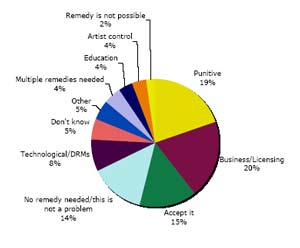
Molly has returned to the United States of 'Mur'ca, so she'll be reclaiming her blog next week. Thank you all for reading and commenting on my writings. I was trying to think of a single, big topic to end with, but I've come up empty. So instead, I'll leave you with a few predictions about the future of music:
1) There will emerge something called a "gay aesthetic" dubbed as such by metrosexuals who hope to be able to conceptually experience a sexuality spectrum wider than they are willing to act on. Buzzwords will be used and analyses will be published, but behind the smoke and mirrors, the "gay aesthetic" will be reduced to the following: Male composers sometimes write feminine-sounding sonorities, and female composers sometimes write masculine-sounding sonorities. (The National Organization of Bi-Curious Composers will set the guidelines to distinguish between feminine- and masculine-sounding sonorities.)
2) A new genre called "post-whatever" will become the next direction for Generation Z art-music. The term "post-whatever" will be utilized without a hint of sarcasm or disaffection. (Incidentally, a slightly different genre will take hold of the literary arts, dubbed "post-whatsoever") (Tip o' the hat to Peter)
3) As part of the "post-whatever" genre, creative musicians will follow the Hollywood trend of remaking recent masterpieces only a decade or two after the originals were made.
4) People will begin to accept that geographically lopsided arts funding may have something to do with population density.
5) Laurie Anderson and Lou Reed will divorce.
6) Authenticity and mediation will come to mean the same thing.
and finally...
7) John Luther Adams will discover a way to control Earth's climate through music.
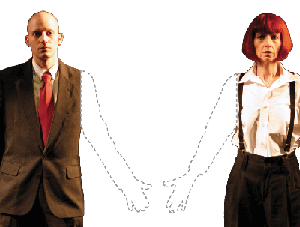 In September 2007, my piece Removable Parts premiered at HERE Arts Center in New York City.
In September 2007, my piece Removable Parts premiered at HERE Arts Center in New York City. (A brief synopsis: Removable Parts is an hour-long music-theater piece that utilizes the real-life phenomenon of self-amputation as a metaphor for the desire to escape physical, emotional, and psychological pain.)
The reason I mention it here is to talk about something that happened in one of the post-performance discussions with the audience. Two people in particular, including a well-known expert on disability, took issue with what they called a "lack of authenticity" in the piece. They suggested that the two performers on stage (me and pianist Kathleen Supové) did not have the experience necessary to fully understand, or fully appreciate, the issues that disabled people have to face.
Putting aside for the moment the fact that none of the characters in Removable Parts are actually supposed to be disabled, what really upset me about these comments was the implication that empathy is not enough. It didn't seem to matter how much reading I had done, how many people I had interviewed, or even how many people in my life happened to be disabled. Only first-hand experience of disability would give me the right to explore the subject in my music.
Doesn't this kind of academic cordoning-off of "other-ness" discourage people from exploring things beyond their own life-experiences? Apparently, the noblest quality for an artist to possess is an utter lack of curiosity.
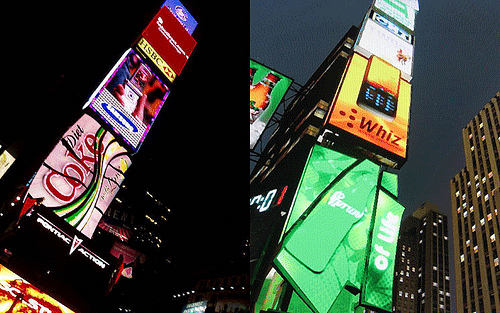 A couple of friends of mine did voice-over work for Grand Theft Auto IV, so I've been playing it quite a bit lately. Apparently, they played very minor characters which means that in order to find them I'll probably have to explore every nook and cranny of Liberty City.
A couple of friends of mine did voice-over work for Grand Theft Auto IV, so I've been playing it quite a bit lately. Apparently, they played very minor characters which means that in order to find them I'll probably have to explore every nook and cranny of Liberty City.In my most recent round of gaming, I managed to chase down and murder two drug dealers while Terry Riley's "A Rainbow in Curved Air" was playing on the radio station in the car I stole. Liberty City has several different internet cafés where I can check my email and explore the internets. The internet cafés tend to play music by Philip Glass.
Alas, Niko (the main character) has no mp3-player.
Here's a fun page where you can look at photographs of New York City and compare them to scenes from the game. Thanks to Jim for pointing it out to me.
Blogroll
AJ Ads
AJ Blogs
AJBlogCentral | rssculture
Terry Teachout on the arts in New York City
Andrew Taylor on the business of arts & culture
rock culture approximately
Laura Collins-Hughes on arts, culture and coverage
Richard Kessler on arts education
Douglas McLennan's blog
Dalouge Smith advocates for the Arts
Art from the American Outback
For immediate release: the arts are marketable
No genre is the new genre
David Jays on theatre and dance
Paul Levy measures the Angles
Judith H. Dobrzynski on Culture
John Rockwell on the arts
Jan Herman - arts, media & culture with 'tude
dance
Apollinaire Scherr talks about dance
Tobi Tobias on dance et al...
jazz
Howard Mandel's freelance Urban Improvisation
Focus on New Orleans. Jazz and Other Sounds
Doug Ramsey on Jazz and other matters...
media
Jeff Weinstein's Cultural Mixology
Martha Bayles on Film...
classical music
Fresh ideas on building arts communities
Greg Sandow performs a book-in-progress
Exploring Orchestras w/ Henry Fogel
Harvey Sachs on music, and various digressions
Bruce Brubaker on all things Piano
Kyle Gann on music after the fact
Greg Sandow on the future of Classical Music
Norman Lebrecht on Shifting Sound Worlds
publishing
Jerome Weeks on Books
Scott McLemee on books, ideas & trash-culture ephemera
theatre
Wendy Rosenfield: covering drama, onstage and off
Chloe Veltman on how culture will save the world
visual
Public Art, Public Space
Regina Hackett takes her Art To Go
John Perreault's art diary
Lee Rosenbaum's Cultural Commentary
Tyler Green's modern & contemporary art blog
